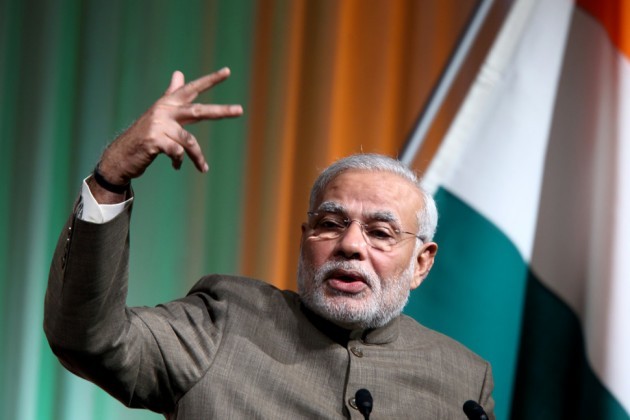(VOVworld) – New Indian Prime Minister Narendra Modi has just concluded his first trip to Japan. Analysts say his 5-day visit has lifted Indian-Japanese bilateral relations to a new height and is considered a step towards the establishment of a new alliance in the region. VOV’s Anh Huyen reports…
Speeches made by Japanese Prime Minister Shinzo Abe and his Indian counterpart Narendra Modi at their joint press briefing during Modi’s visit to Japan clearly indicated both sides’ ambition and determination to seek common prosperity. While Prime Minister N. Modi confirmed that Japan-India cooperation will decide the future of the Asian century, Prime Minister Shinzo Abe highlighted that Japan’s relationship with India had the most potential in the world, adding that it should be uplifted to a special global strategic partnership.
Boosting bilateral economic cooperation
Japan’s commitment to double its investment in India in 5 years, which was 2 billion USD in 2013, was the most significant result of Mr. Modi’s visit to Japan. Japan will also provide India with nearly 500 million USD to develop infrastructure projects. Prime Minister Modi was accompanied by a delegation of many Indian businesses on his trip to Japan and many agreements were signed, reflecting the two nations’ strong determination to boost cooperation.

Prime Minister Narendra Modi is speaking in Tokyo
Photograph by Tomohiro Ohsumi/Bloomberg
|
Most noteworthy during Mr. Modi’s visit to Japan was an agreement approved by the two leaders on bilateral cooperation in producing rare earth for exports to Japan. Accordingly, Japan will import up to 2300 tons of rare earth from India every year, equivalent to 15% of Japanese businesses’ annual demand, with the first shipment to be delivered on February 2015. Rare earth is a essential material for the production of high-tech items and has been mostly monopolized by China. This deal reflects Japan’s determination to diversify the supplies of this important material and reduce its dependence on China. In addition to rare earth production and infrastructure development, India and Japan have also agreed to speed up negotiations on Tokyo’s selling to India of 15 US -2 amphibian helicopters worth 1.65 billion USD. These amphibian helicopters used to be listed as forbidden export items and were under the management of Japan’s national defense over the past 50 years. India has become the first to trade military helicopters with Japan since World War Two. Japan has also allowed India to cooperate in producing the helicopters’ equipment in India’s territory.
In particular, Prime Minister Shinzo Abe and Prime Minister Narenda Modi decided to upgrade and boost defense ties and stressed the importance of annual joint naval exercises and Japan’s continued participation in the Malabar naval drill between India and the US.
Increasing defense and security cooperation
Japan and India have been concerned with China’s increasing ambitions. Both countries want to contain China’s activities in the East Sea, East China Sea, and Indian Ocean. Both Tokyo and New Delhi have had territorial disputes with Beijing and the increased level of China’s sovereignty claims in recent years have raised concerns in the region. Although neither Prime Minister Abe nor Prime Minister Modi mentioned relations with China, observers said topics for discussion and statements made during their visits were both countries’ joint foreign policy to confront China in territorial disputes.
Creating counterweight in the region, fostering bilateral ties for mutual benefit
Since taking office, Prime Minister Modi announced plans to increase defense along the border with China and signaled India’s new military capability. New Delhi and Tokyo have strengthened defense cooperation through joint naval exercises. To a larger extent, Indian, Japanese, and US warships have conducted anti-submarine exercises in the Pacific.
The strengthening of Japan and India’s defense and security cooperation are steps toward building a new alliance. Allying with India will help Japan increase its exports and strengthen security to deal with increasing risks as a result of China’s military development. In return, an alliance with Japan will help Prime Minister Modi realize his campaigning promise of restoring India’s power and influence in the regional and international arena. He has mapped out a vision for his foreign policy with a 5-day visit to Japan. Therefore, a handshake between Tokyo and New Delhi will certainly bring about major geopolitical changes in the region.